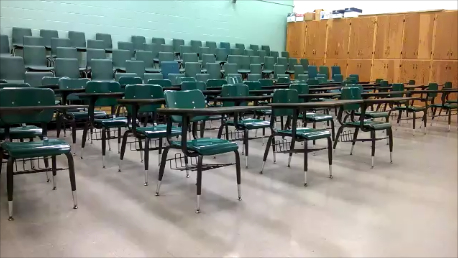"Myths and Misperceptions"
“The median wage is $800 per credit hour on a range of about $600 to $1000 per credit hour, depending on . . . whether you have PhD, or a master's degree, how long you've been there, how many courses you've taught. At $800 a credit hour, it's impossible to earn a living wage. The university limits an adjunct faculty member to only teaching 21 credit hours per academic year, so at $800 a credit hour, that's . . . $16,800.”
-- Matt Williams, Adjunct, Vice President, New Faculty Majority (NFM)
Fulwiler and Marlow expand their shattering oral history even further by incorporating a variety of observations from faculty regarding the “Myths and Misperceptions” common to the national discussion of contingency in higher education. In this portion of the film, interviewees highlight several of the difficulties faced by contingent faculty on a daily basis, difficulties that may be unknown to those who have not experienced them first-hand.
As Matt Williams makes clear in the passage above, one painful reality of adjunct labor is that instructors often do not receive pay that is commensurate with their education level, work experience or their work history at the school, all of which are traditionally thought of as the defining factors taken into consideration for pay raises and promotions. Williams’ description of this economic hardship raises the question of how much colleges and universities really care about the education they are providing their students, given that these institutions apparently place such a low premium on the instructors who are entrusted with the mission of doing the actual educating.
Likewise, adjunct instructors are hampered by their frequent need to teach at multiple campuses in order to make ends meet. For example, Jennifer Lee, an English Adjunct, describes how her need to teach at three different campuses caused her to not have as much time for her students or for valuable interactions with other faculty, especially given the demands on her schedule from travel. Perhaps these sacrifices would be more tolerable if there was a strong possibility for promoting out of contingency into more secure full-time employment, but that is another conflicted area within higher education.
As Jessica Brouker, an English Adjunct, explains, adjunct faculty cannot always trust in their departments to recognize their hard work and accomplishments by promoting them into full-time positions. Even departments that have a good record of steady promotions cannot be relied upon to continue to do so. For instance, Steve Street, an Adjunct in English, describes how he worked hard and at “many different campuses, but . . . once you get on the adjunct track, . . . you tend to stay on that track.” One of the central contradictions within this academic caste-system is that while colleges and universities continue to rely more and more on contingent faculty, there is a pervasive trend of thinking of adjuncts as temporary faculty.
According to Mike Palmquist, the Associate Vice Provost of Learning and Teaching at Colorado State University, he faced great opposition when he “brought a proposal from the composition faculty to allow adjunct faculty to have a voice in [the] department executive committee, and I heard a range of really heartfelt arguments against doing that.” The proposal was eventually approved, but the department’s initial resistance is telling. Just as institutions of higher education devalue adjuncts and devalue their labor through poor compensation and the subsequently crowded schedules adjuncts are obliged to take on, departments do their own students a great disservice by not allowing adjunct faculty to play a direct role in department operations and curriculum development.
As if creating an underclass of instructor-laborers was not bad enough, departments’ decision to forbid those instructors from having a say in the thankless labor they carry out is what transforms an unfair situation into a nightmare reminiscent of Kafka’s most despairing work. The moment you realize how disposable you really are as an adjunct is like going to bed a human being and waking up an insect, except you’re an insect that still has to operate the projector. That is, if you’re lucky enough to work for a school that has projectors in every classroom.
